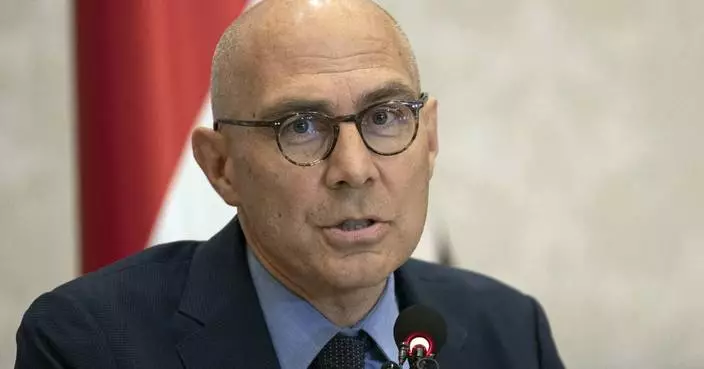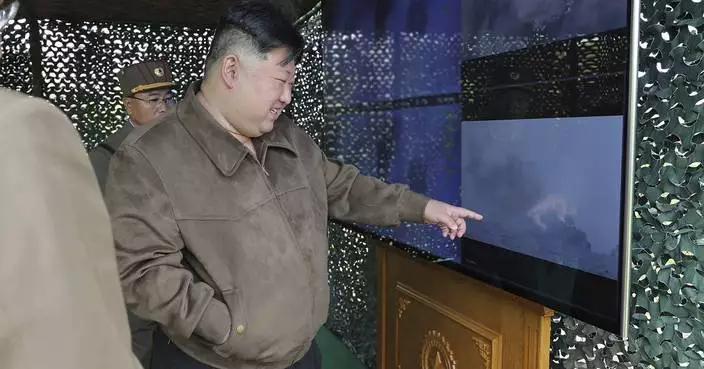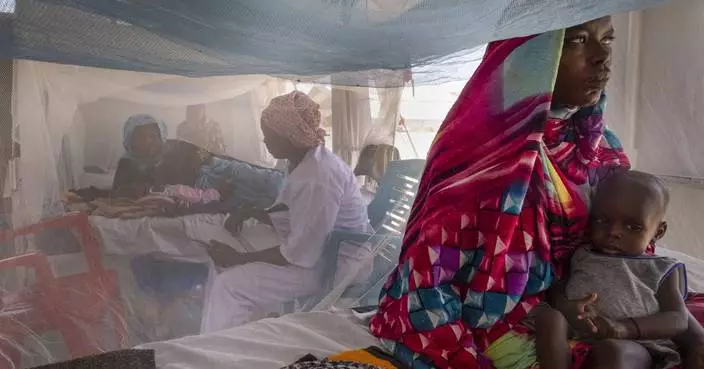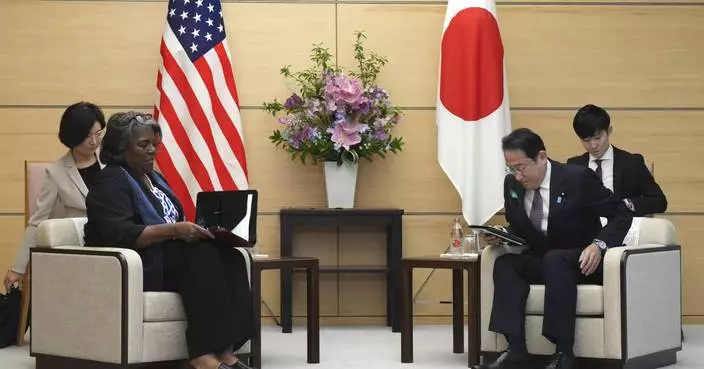The U.N. humanitarian chief said Monday there has been "no progress" in dealing with the reasons why more than 700,000 Rohingya Muslims fled to Bangladesh from western Myanmar's Rakhine state.
Mark Lowcock, who just returned from a visit to Bangladesh, said Myanmar has failed "to put in place confidence-building measures that would persuade people it's safe to go back."
He said all the refugees he spoke to didn't think it was safe to return, and want to be assured of things like freedom of movement and access to education, jobs and services.
Buddhist-majority Myanmar has long considered the Rohingya to be "Bengalis" from Bangladesh even though their families have lived in the country for generations. Nearly all have been denied citizenship since 1982, effectively rendering them stateless, and they are also denied freedom of movement and other basic rights.
The latest crisis began with attacks by an underground Rohingya insurgent group on Myanmar security personnel in August 2017 in northern Rakhine. Myanmar's military responded with a brutal campaign and is accused of mass rape, killings and the burning of thousands of homes that critics have described as ethnic cleansing, or even genocide.
Lowcock told a small group of reporters he is "extremely worried" that the U.N. appeal for $962 million to provide for the Rohingya refugees and their host communities in Bangladesh this year is only 17% funded.
"I think the world may be losing interest," he said. "Last year, we got 70% what we asked for. We're running way behind."
He warned that "if we don't get financed, the consequences will be serious" for the provision of such things as food rations and health services.
Lowcock visited Bangladesh with U.N. refugee chief Filippo Grandi and Antonio Vitorino, head of the International Office for Migration. In a joint statement, they stressed the need to sustain support for the Rohingya refugees and to keep working for "safe and sustainable solutions" so they can return home.
They noted that almost half the 540,000 refugee children under age 12 are missing out on education and the rest are only getting very limited schooling.
"I think the world ought to worry about what this very large group of people will be like in 10 years' time if they don't get an opportunity to access education and a chance to develop a livelihood and have a normal life," Lowcock told reporters.
While the best solution would be for the refugees to return home, he said, "in any event it's a bad idea to run the risk of a very aggrieved, disaffected large group of young people, especially young men."
Lowcock said Bangladesh's government expressed concern to the three U.N. officials during the trip about criminal activity among refugees in the Cox's Bazaar area.
"There are well-known concerns about the drugs industry trying to use populations in Cox's Bazaar to support their malign activities," Lowcock said, adding that there are also concerns about possible radicalization of refugees.
WASHINGTON (AP) — Lawyers for an American believed to be held by the Taliban for nearly two years are asking a United Nations human rights investigator to intervene, citing what they say is cruel and inhumane treatment.
Ryan Corbett was abducted Aug. 10, 2022, after returning to Afghanistan, where he and his family had been living at the time of the collapse of the U.S.-based government there a year earlier. He arrived on a valid 12-month visa to pay and train staff as part of a business venture he led aimed at promoting Afghanistan's private sector through consulting services and lending.
Corbett has since been shuttled between multiple prisons, though his lawyers say he has not been seen since last December by anyone other than the people with whom he was detained.
In a petition sent Thursday, lawyers for Corbett say that he's been threatened with physical violence and torture and has been malnourished and deprived of medical care. He's been held in solitary confinement, including in a basement cell with almost no sunlight and exercise, and his physical and mental health have significantly deteriorated, the lawyers say.
Corbett has been able to speak with his family by phone five times since his arrest, including last month. His family has not been able to see him — his only visits have been two check-ins from a third-party government — and their characterizations of his mistreatment are based on accounts from recently released prisoners who were with him and his openly dispirited tone in conversations.
“During Mr. Corbett’s most recent call with his wife and children, Mr. Corbett indicated that the mental torture and anguish have caused him to lose all hope,” said the petition, signed by the Corbett family attorneys, Ryan Fayhee and Kate Gibson.
The petition is addressed to Alice Edwards, an independent human rights investigator and the special rapporteur for torture in the Office of the High Commissioner for Human Rights at the U.N. It asks Edwards, who was appointed by the U.N. Human Rights Council, to “urgently reach out to the Taliban to secure Mr. Corbett’s immediate release and freedom from torture, as guaranteed by international law.”
"This situation is just dragging on, and I’m increasingly concerned and taking steps that I hope will make a difference and help the situation — just increasingly concerned and panicking about Ryan’s deteriorating health and physical and mental health," Corbett's wife, Anna, said in an interview. “And that was leading me to take this next step.”
The U.S. government is separately working to get Corbett home and has designated him as wrongfully detained. A State Department spokesman told reporters last month that officials had continually pressed for Corbett's release and were “using every lever we can to try to bring Ryan and these other wrongfully detained Americans home from Afghanistan."
A spokesperson for the Interior Ministry in Afghanistan said this week that it had no knowledge of Corbett's case.
Corbett, of Dansville, New York, first visited Afghanistan in 2006 and relocated there with his family in 2010, supervising several non-governmental organizations.
The family was forced to leave Afghanistan in August 2021 when the Taliban captured Kabul, but he returned the following January so that he could renew his business visa. Given the instability on the ground, the family discussed the trip and “we were all pretty nervous,” Corbett's wife said.
But after that first uneventful trip, he returned to the country in August 2022 to train and pay his staff and resume a business venture that involved consulting services, microfinance lending and evaluating international development projects.
While on a trip to the northern Jawzjan province, Corbett and a Western colleague were confronted by armed members of the Taliban and were taken first to a police station and later to an underground prison.
Anna Corbett said that when she learned her husband had been taken to a police station, she got “really scared” but that he was optimistic the situation would be quickly resolved.
That, however, did not happen, and Anna Corbett, who has three teenage children and makes regular trips to Washington, said she's trying to advocate as forcefully as she can while not letting “anxiety take over.”
“I feel like it’s the uncertainty of all of it that just is so difficult because you just don’t know what’s going to come at you — what call, what news," she said. "And I’m worried about Ryan and the effect of the trauma on him and then also on my kids, just what they’re experiencing. I've tried to protect them the best I could, but this is so difficult.”
Associated Press writer Riazat Butt in Kabul, Afghanistan, contributed to this report.
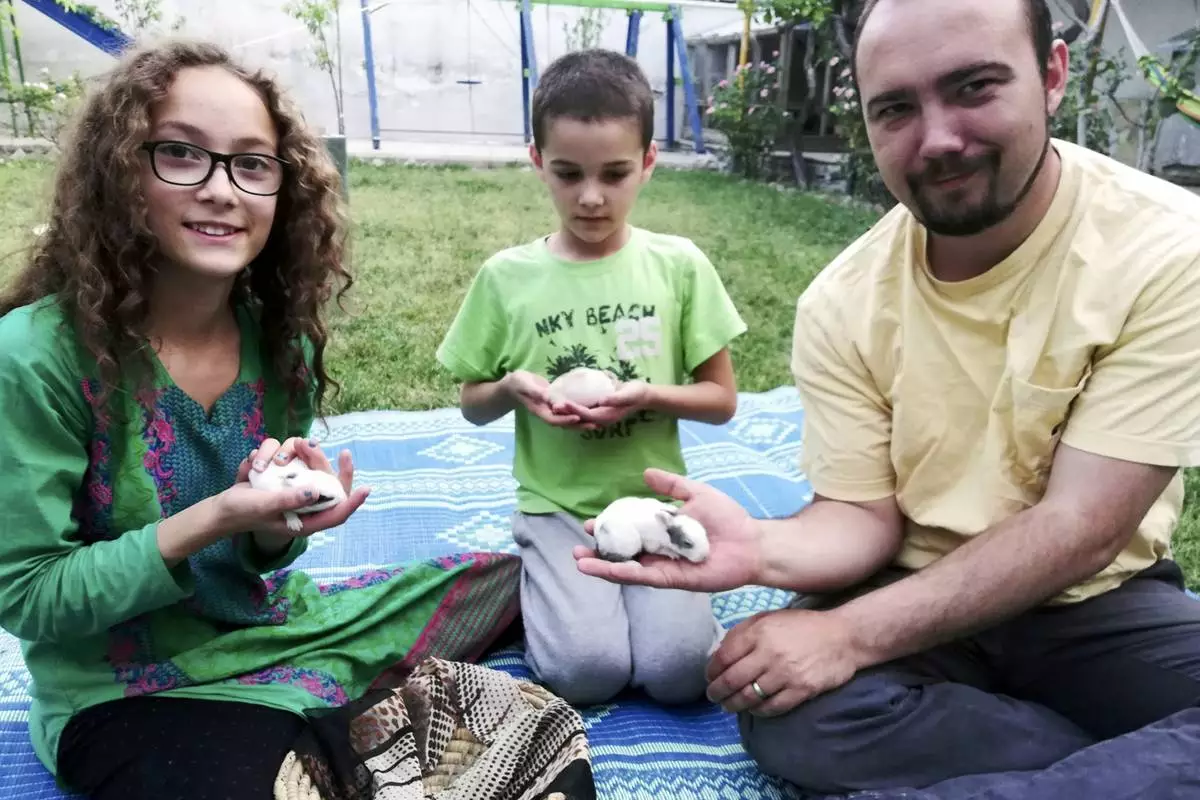
This family photo shows Ryan Corbett holding rabbits with his daughter Miriam and son Caleb in Kabul, Afghanistan in 2020. Lawyers for Corbett, believed held by the Taliban for nearly two years, are asking a United Nations human rights investigator to intervene, citing what they say is cruel and inhumane treatment. Corbett was abducted on August 10, 2022 after returning to Afghanistan, where he and his family had been living at the time of the collapse of the U.S.-based government there one year earlier, on a valid 12-month business visa to pay and train staff. (AP Photo/Anna Corbett)





